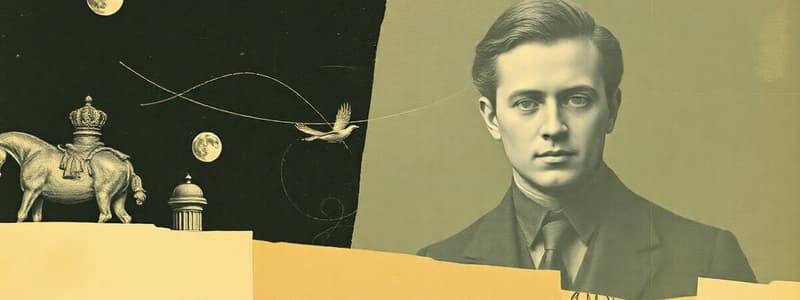Podcast
Questions and Answers
In Horace's Ode 1.1, what is the primary purpose of listing various human pursuits?
In Horace's Ode 1.1, what is the primary purpose of listing various human pursuits?
- To contrast these pursuits with the enduring value of poetry. (correct)
- To critique the futility of materialistic ambitions.
- To highlight the universal desire for wealth and power.
- To advocate for a balanced lifestyle incorporating all endeavors.
How does Horace position himself in relation to Greek poets in Ode 1.1?
How does Horace position himself in relation to Greek poets in Ode 1.1?
- As a critic of their style, intending to innovate beyond their forms.
- As a successor inspired by their tradition, aspiring to similar recognition. (correct)
- As a translator, primarily focused on adapting their works for a Roman audience.
- As a direct competitor aiming to surpass their achievements.
What is the significance of Horace addressing Maecenas in the opening lines of Ode 1.1?
What is the significance of Horace addressing Maecenas in the opening lines of Ode 1.1?
- To subtly seek his continued patronage by aligning poetry with nobility. (correct)
- To establish a personal relationship separate from his artistic endeavors.
- To formally dedicate the entire collection of Odes to him as a patron.
- To publicly acknowledge Maecenas's superior understanding of poetic arts.
Which of the following best describes a central theme explored in Horace's Ode 1.1?
Which of the following best describes a central theme explored in Horace's Ode 1.1?
How does Horace use the examples of farmers, merchants, and soldiers in Ode 1.1?
How does Horace use the examples of farmers, merchants, and soldiers in Ode 1.1?
What inference can be made about Horace's view on poetry based on Ode 1.1?
What inference can be made about Horace's view on poetry based on Ode 1.1?
Which aspect of Horace's artistic identity does Ode 1.1 primarily establish?
Which aspect of Horace's artistic identity does Ode 1.1 primarily establish?
How does the structure of Ode 1.1 contribute to its overall message?
How does the structure of Ode 1.1 contribute to its overall message?
What can be inferred from Horace's admiration for Pindar in Ode 1.1?
What can be inferred from Horace's admiration for Pindar in Ode 1.1?
Which of the following best captures the significance of Ode 1.1 as an introduction to Horace's Odes?
Which of the following best captures the significance of Ode 1.1 as an introduction to Horace's Odes?
What is the underlying message about human fulfillment conveyed through Horace's choice of poetry over other pursuits?
What is the underlying message about human fulfillment conveyed through Horace's choice of poetry over other pursuits?
How does Horace use the theme of the variety of human ambition to enhance the impact of his personal choice?
How does Horace use the theme of the variety of human ambition to enhance the impact of his personal choice?
In Ode 1.1, what does Horace imply about the relationship between art and patronage?
In Ode 1.1, what does Horace imply about the relationship between art and patronage?
Which statement accurately reflects Horace's perspective on the enduring quality of poetry as presented in Ode 1.1?
Which statement accurately reflects Horace's perspective on the enduring quality of poetry as presented in Ode 1.1?
How does Horace's Ode 1.1 contribute to our understanding of Roman values during that period?
How does Horace's Ode 1.1 contribute to our understanding of Roman values during that period?
What is the function of the references to athletic glory, political power, and agriculture in Horace's Ode 1.1?
What is the function of the references to athletic glory, political power, and agriculture in Horace's Ode 1.1?
How does Horace subtly elevate the status of poetry compared to the other endeavors mentioned in Ode 1.1?
How does Horace subtly elevate the status of poetry compared to the other endeavors mentioned in Ode 1.1?
Considering the historical context, what does Horace's emphasis on Greek poetic traditions suggest about Roman culture at the time?
Considering the historical context, what does Horace's emphasis on Greek poetic traditions suggest about Roman culture at the time?
What implication can be drawn from Horace's choice to position his Odes with Ode 1.1?
What implication can be drawn from Horace's choice to position his Odes with Ode 1.1?
In what way does Ode 1.1 function as a subtle form of self-promotion for Horace?
In what way does Ode 1.1 function as a subtle form of self-promotion for Horace?
Flashcards
Horace's Ode 1.1
Horace's Ode 1.1
The opening poem of Horace's Odes, introducing the collection and outlining paths to happiness.
Glory in Athletics
Glory in Athletics
Achieving fame through victories in athletic competitions.
Political Power and Status
Political Power and Status
Seeking positions in government or high social standing.
Agriculture
Agriculture
Signup and view all the flashcards
Commerce and Wealth
Commerce and Wealth
Signup and view all the flashcards
Military Life
Military Life
Signup and view all the flashcards
Hunting
Hunting
Signup and view all the flashcards
Variety of Human Ambition
Variety of Human Ambition
Signup and view all the flashcards
The Superiority of Poetry
The Superiority of Poetry
Signup and view all the flashcards
Influence of Greek Traditions
Influence of Greek Traditions
Signup and view all the flashcards
Study Notes
- Ode 1.1 introduces Horace's Odes, a lyric poetry collection from 23 BCE.
- The poem introduces the work, highlighting diverse paths to happiness and promoting poetry as a lasting pursuit.
Summary of Ode 1.1
- People pursue different ambitions to find purpose and happiness.
- Olympic victories bring glory to some.
- Political office and social status appeal to others.
- Farmers find contentment in agriculture.
- Merchants brave the seas in pursuit of wealth.
- Soldiers seek honor through military service.
- Some are fulfilled by hunting.
- Horace chooses poetry, specifically lyric poetry inspired by Greek traditions, as his preferred path.
- Horace admires Pindar and other Greek poets, aspiring to join their ranks
Themes
- The poem emphasizes the wide array of human ambitions and desires.
- Poetry, particularly lyric verse, is subtly presented as superior to material pursuits.
- Horace connects himself to Greek lyric poets, highlighting his artistic goals and influences.
Significance
- Ode 1.1 functions as a manifesto for Horace's poetic career.
- The poem establishes Horace's identity as a poet.
- It subtly seeks patronage from Maecenas.
- The poem sets the tone for the Odes, which values art and philosophical thought above fleeting worldly matters.
Studying That Suits You
Use AI to generate personalized quizzes and flashcards to suit your learning preferences.



